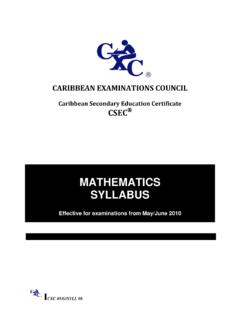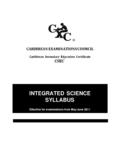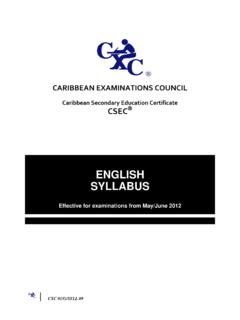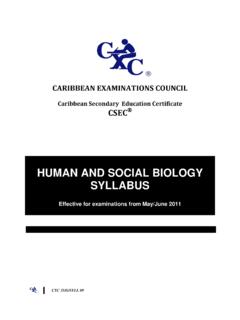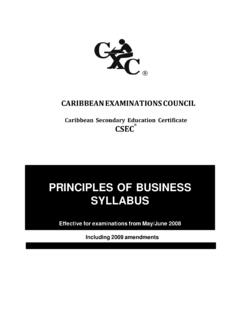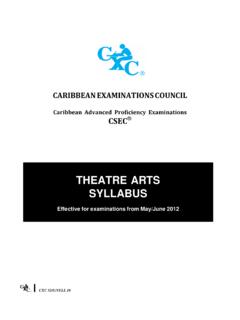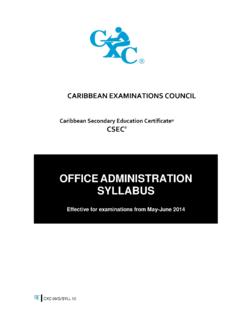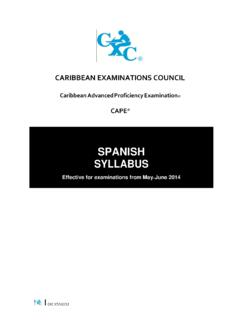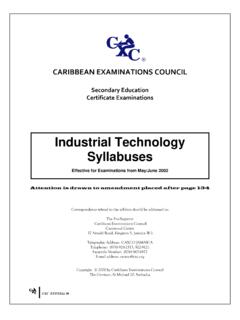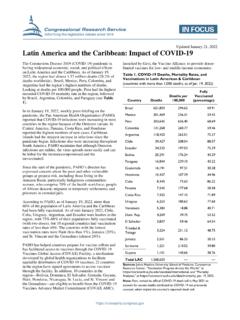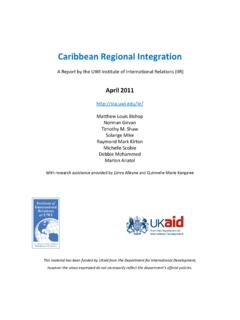Transcription of CARIBBEAN EXAMINATIONS COUNCIL
1 CXC A27/U2/13 CARIBBEAN EXAMINATIONS COUNCIL CARIBBEAN Advanced Proficiency Examination CAPE SOCIOLOGY SYLLABUS Effective for EXAMINATIONS from May June 2014 CXC A27/U2/13 Published by the CARIBBEAN EXAMINATIONS COUNCIL All rights reserved. No part of this publication may be reproduced, stored in a retrieval system, or transmitted in any form, or by any means electronic, photocopying, recording or otherwise without prior permission of the author or publisher. Correspondence related to the syllabus should be addressed to: The Pro-Registrar CARIBBEAN EXAMINATIONS COUNCIL Caenwood Centre 37 Arnold Road, Kingston 5, Jamaica Telephone Number: + 1 (876) 630-5200 Facsimile Number: + 1 (876) 967-4972 E-mail Address: Website: Copyright 2013 by CARIBBEAN EXAMINATIONS COUNCIL The Garrison, St Michael BB14038, Barbados CXC A27/U2/13 This document CXC A27/U2/13 replaces CXC A27/U2/04 issued in 2005.
2 Please note that the syllabus has been revised and amendments are indicated by italics. First published 2004 Reprinted 2013 Please check the website for updates on CXC s syllabuses. CXC A27/U2/13 INTRODUCTION .. i 1 1 SKILLS AND ABILITIES TO BE ASSESSED .. 2 PRE-REQUISITES OF THE SYLLABUS .. 3 STRUCTURE OF THE SYLLABUS .. 3 UNIT 1: THE SOCIOLOGICAL PERSPECTIVE MODULE 1: SOCIOLOGICAL CONCEPTS, PERSPECTIVES AND METHODS .. 4 MODULE 2: SOCIAL INSTITUTIONS: FAMILY, RELIGION, EDUCATION .. 7 MODULE 3: SOCIAL STRATIFICATION .. 11 UNIT 2: DEVELOPMENT AND SOCIAL CHANGE MODULE 1: POPULATION AND DEVELOPMENT .. 14 MODULE 2: CRIME AND DEVIANCE .. 18 MODULE 3: CARIBBEAN SOCIAL ISSUES: POVERTY, HEALTH AND ENVIRONMENT .. 21 OUTLINE OF ASSESSMENT .. 26 REGULATIONS FOR PRIVATE CANDIDATES .. 37 REGULATIONS FOR RESIT CANDIDATES.
3 38 ASSESSMENT GRID .. 38 GLOSSARY OF BEHAVIOURAL VERBS USED IN THE SOCIOLOGY EXAMINATION .. 39 Contents ContentsIntroduction CXC A27/U2/13 i he CARIBBEAN Advanced Proficiency Examination (CAPE) is designed to provide certification of the academic, vocational and technical achievement of students in the CARIBBEAN who, having completed a minimum of five years of secondary education, wish to further their studies. The EXAMINATIONS address the skills and knowledge acquired by students under a flexible and articulated system where subjects are organised in 1-Unit or 2-Unit courses with each Unit containing three Modules. Subjects examined under CAPE, may be studied concurrently or singly. The CARIBBEAN EXAMINATIONS COUNCIL offers three types of certification. The first is the award of a certificate showing each CAPE Unit completed.
4 The second is the CAPE Diploma, awarded to candidates who have satisfactorily completed at least six Units including CARIBBEAN Studies. The third is the CXC Associate Degree, awarded for the satisfactory completion of a prescribed cluster of seven CAPE Units including CARIBBEAN Studies and Communication Studies. For the CAPE Diploma and the CXC Associate Degree, candidates must complete the cluster of required Units within a maximum period of five years. Recognised educational institutions presenting candidates for the CXC Associate Degree in one of the nine categories must, on registering these candidates at the start of the qualifying year, have them confirm, in the required form, the Associate Degree they wish to be awarded. Candidates will not be awarded any possible alternatives for which they did not apply. T Introduction CXC A27/U2/13 1 Sociology Syllabus RATIONALE ociology is a scientific study of social interactions, social institutions, social patterns and social change of human society guided by sociological theories and methods.
5 CARIBBEAN society has been shaped by historical forces which have led to the emergence of several small diverse and divided societies, each unique in many respects but sharing a common history of colonialism, slavery and indentureship. Despite evidence of socio-economic transformation and the influence of globalisation, the region still maintains a distinct identity. In this regard, sociology can equip students with the necessary knowledge, orientation and skills for understanding society in general and CARIBBEAN Society in particular. The syllabus introduces students to theories and research methods of sociology, the sociological perspective and the processes of social structural change with specific emphasis on the development and modernisation of societies. Students will acquire a set of sociological competencies that will enable them to use the practical and problem-solving approaches to the analysis of society.
6 Based on the attributes of the Ideal CARIBBEAN Person as articulated by caricom , this course of study in CAPE Sociology can contribute to the development of a CARIBBEAN person who is emotionally secure with a high level of self-confidence and self-esteem; see ethnic, religious and other diversity as a source of potential strength and richness; has an informed respect for our cultural heritage; values and displays the creative imagination in its various manifestations and nurtures its development in economic and entrepreneurial spheres in all other areas of life . Based on UNESCO Pillars of Learning, this course of study will also contribute to a person who will learn to know, learn to do, learn to live together, learn to be and learn to transform oneself and society. AIMS The syllabus aims to: 1. equip students with the sociological concepts, theories/perspectives and methods to better understand human society; 2.
7 Develop an awareness of the cultural heritage and identity of CARIBBEAN people; 3. develop an appreciation of family and kinship values, community cohesion, moral and social responsibility and commitment to the CARIBBEAN ; 4. develop an understanding of CARIBBEAN social issues; S CXC A27/U2/13 2 5. develop an appreciation of the dynamics of CARIBBEAN society, focusing on socio-cultural continuity and change, diversity and similarity, consensus and conflict. SKILLS AND ABILITIES TO BE ASSESSED The skills and abilities that students are expected to develop on completion of this syllabus have been grouped under three headings: 1. Knowledge and Understanding; 2. Interpretation and Application; 3. Analysis and Evaluation. Knowledge and Understanding The EXAMINATIONS will test candidates skills and ability to: 1. define the terms and concepts that are relevant to sociology; 2.
8 Explain sociological principles and perspectives; 3. discuss the social issues that impact on development in the CARIBBEAN ; 4. describe various methods of sociological research; 5. discuss the findings from relevant sociological studies and research data. Interpretation and Application The EXAMINATIONS will test candidates skills and ability to: 1. interpret and make inferences from qualitative and quantitative data; 2. distinguish between facts, opinions and value judgements; 3. use various methods of investigation; 4. use concepts, theories or perspectives; 5. select and apply sociological perspectives to a CARIBBEAN context. Analysis and Evaluation The EXAMINATIONS will test candidates skills and ability to: 1. analyse different forms of data; 2. analyse sociological and non-sociological evidence and arguments; 3. recognise limitations and bias in evidence; CXC A27/U2/13 3 4.
9 Evaluate the strengths and limitations of sociological perspectives; 5. assess the relevance of various sociological perspectives for understanding issues in the CARIBBEAN region; 6. draw reasoned conclusions based on sociological evidence or data findings. PRE-REQUISITES OF THE SYLLABUS Any person with a good grasp of the CARIBBEAN Secondary Education Certificate (CSEC) Social Studies, History or Geography syllabuses or the equivalent, should be able to pursue the course of study defined by this syllabus. However, success in the course of study will also depend on possession of good verbal and written communication skills. STRUCTURE OF THE SYLLABUS The syllabus consists of two Units of 150 hours each, comprising three Modules of 50 hours each. Each Module is compulsory. Together the two Units provide a comprehensive introduction to the field of CARIBBEAN and mainstream Sociology.
10 UNIT 1: THE SOCIOLOGICAL PERSPECTIVE Module 1 - Sociological Concepts, Perspectives and Methods Module 2 - Social Institutions: Family, Religion, Education Module 3 - Social Stratification UNIT 2: DEVELOPMENT AND SOCIAL CHANGE Module 1 - Population and Development Module 2 - Crime and Deviance Module 3 - CARIBBEAN Social Issues: Poverty, Health and Environment CXC A27/U2/13 4 UNIT 1: THE SOCIOLOGICAL PERSPECTIVE MODULE 1: SOCIOLOGICAL CONCEPTS, PERSPECTIVES AND METHODS GENERAL OBJECTIVES On completion of this Module, students should: 1. understand the development of Sociology as a discipline; 2. understand the fundamental concepts in Sociology; 3. understand the main theoretical perspectives in Sociology; 4. understand the manifestations of culture in CARIBBEAN society; 5. understand the key principles and practices of scientific research; 6.
